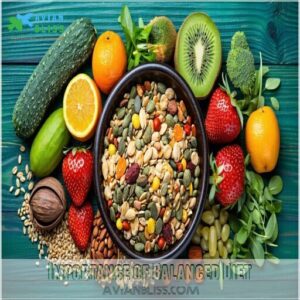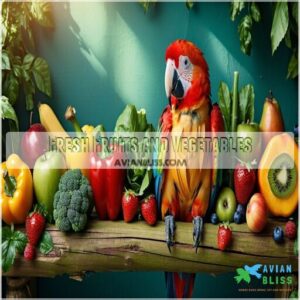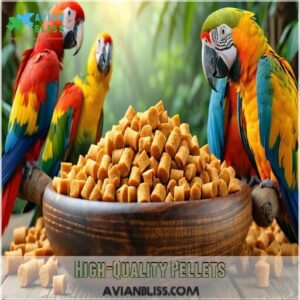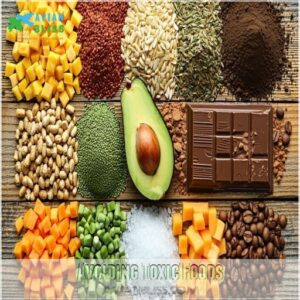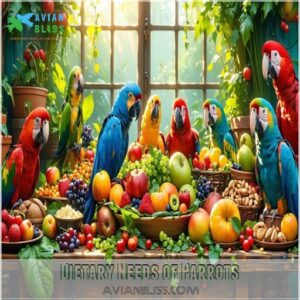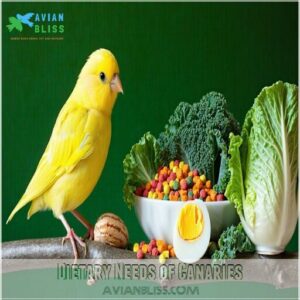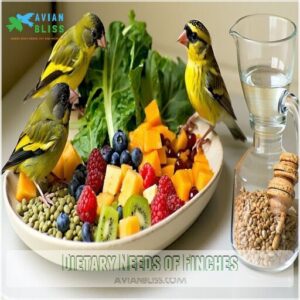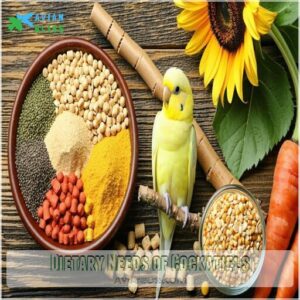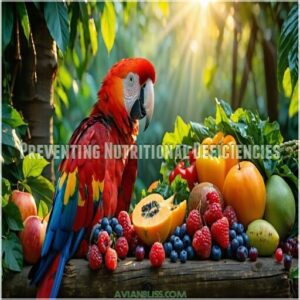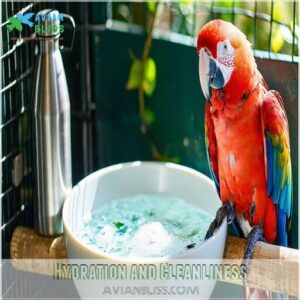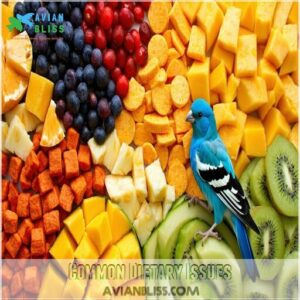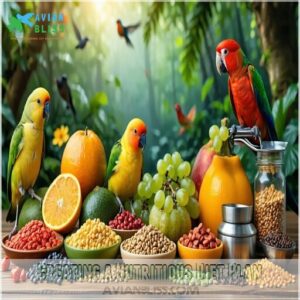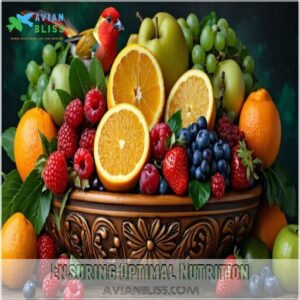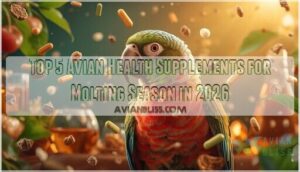This site is supported by our readers. We may earn a commission, at no cost to you, if you purchase through links.
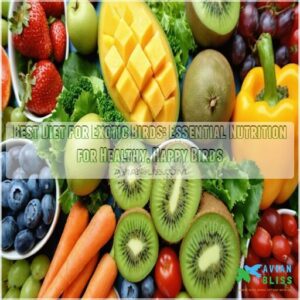
Think of it like crafting a colorful salad—variety is key! Birds rely on balanced nutrients, so include leafy greens, berries, and orange veggies like carrots for vitamins.
Pellets should make up most of their diet, as they’re nutritionally complete. Avoid avocado, chocolate, and caffeine—they’re toxic.
Offer clean water daily, and don’t forget, birds love a treat (in moderation). Watching their health? A vet can guide you.
A little planning keeps your feathered friend chirping happily every day. Curious about species-specific needs? Stay tuned!
Table Of Contents
- Key Takeaways
- Essential Nutrients for Exotic Birds
- Importance of Balanced Diet
- Choosing The Right Foods
- Specific Dietary Needs
- Preventing Nutritional Deficiencies
- Hydration and Cleanliness
- Common Dietary Issues
- Creating a Nutritious Diet Plan
- Nutrition and Health
- Ensuring Optimal Nutrition
- Frequently Asked Questions (FAQs)
- What do birds eat?
- Do exotic animals need a diet?
- What do omnivorous birds eat?
- What should a carnivorous bird eat?
- What should a bird eat a day?
- What do pelleted birds eat?
- What is the healthiest food for birds?
- What is the most critical nutrient to birds?
- What is the best bird food for backyard birds?
- What do birds like to eat the best?
- Conclusion
Key Takeaways
- Feed your exotic bird a balanced diet with 60-70% high-quality pellets, 20-30% fresh fruits and vegetables, and 10% seeds or treats to meet their nutritional needs.
- Avoid harmful foods like avocado, chocolate, caffeine, and foods with artificial additives to keep your bird safe and healthy.
- Ensure variety in their diet by including leafy greens, berries, nuts, and occasional protein sources like cooked legumes or insects.
- Provide fresh water daily, monitor their weight, and consult an avian vet regularly to adjust their diet as needed for optimal health.
Essential Nutrients for Exotic Birds
You’ll need to provide your feathered friend with proteins, fats, carbohydrates, vitamins, and minerals to support their unique biological needs.
Just as you wouldn’t thrive on a diet of only bread, your exotic bird needs a balanced mix of nutrients from quality pellets, fresh fruits, vegetables, and appropriate seeds to maintain vibrant feathers and energetic behavior.
A balanced mix of nutrients ensures your exotic bird thrives with vibrant feathers, boundless energy, and radiant health.
Proteins and Amino Acids
Why are proteins essential for your exotic bird? They’re the building blocks that support growth, feather development, and tissue repair.
Your feathered friend needs specific amino acids—particularly lysine and methionine—which they can’t produce naturally. Great protein sources include high-quality pellets, legumes, nuts, seeds, and insects.
Watch for protein deficiency symptoms like poor feather quality and low energy. Larger parrots need 10-15% protein, while smaller birds require up to 20%.
To guarantee the best health, consider how seasonal diets can vary.
Fats: Necessary Energy Sources
While proteins build your bird’s body, fats fuel its daily activities.
These concentrated energy sources help absorb vitamins A, D, E, and K, making them essential for exotic bird health.
For ideal bird nutrition, include:
- Omega-3 rich items like flaxseeds and walnuts
- Moderate portions of sunflower seeds (high in healthy fats)
- Chia seeds for balanced fat intake
- Small amounts of nuts as occasional treats
Keep fat at 4-10% of your bird’s diet to prevent obesity risks and ensure a balanced intake of healthy fats.
Carbohydrates for Energy
Carbohydrates serve as your exotic bird’s primary energy source.
Complex carbs from whole grains provide sustained energy, while simple sugars from fruits offer quick fuel.
Fiber benefits include improved digestion and gut health.
For ideal bird nutrition, include brown rice, quinoa, sweet potatoes, and berries in their balanced diet.
Avoid refined sugars, which can lead to unhealthy weight gain and energy crashes.
Vitamins for Optimal Health
Vitamins serve as the invisible guardians of your exotic bird’s wellbeing.
Vitamin A supports vision and immune function, while Vitamin D3 guarantees proper calcium absorption for strong bones.
Vitamin E acts as a protective shield against cell damage.
B-complex vitamins keep your feathered friend energetic and metabolically sound.
Colorful fruits and vegetables—like bell peppers, dark leafy greens, and carrots—naturally deliver these essential nutrients.
Without adequate vitamins, birds may show deficiency symptoms including lethargy, poor feather quality, and weakened immunity.
For birds with limited diets, quality vitamin supplements can bridge nutritional gaps, but they shouldn’t replace a varied diet.
Minerals for Strong Bones
Strong bones start with proper bird calcium sources like cuttlebone and balanced supplements.
These support bone density, egg production, and overall bird health.
Don’t skip phosphorus balance, as it aids mineral absorption.
Deficiency symptoms, like brittle bones, highlight the importance of proper bird nutrition.
Meeting bird dietary needs guarantees minerals deliver the strength your feathered friend needs to thrive.
Importance of Balanced Diet
You’ll guarantee your exotic bird thrives when you provide a diet that contains the right balance of proteins, fats, carbohydrates, vitamins, and minerals in proper proportions.
Just as you wouldn’t stay healthy eating only one type of food, your feathered friend needs variety to maintain peak health, prevent obesity, and support their immune system.
Preventing Malnutrition
Many exotic birds suffer from malnutrition despite owners’ best intentions.
Preventing this requires strategic balanced rations with proper dietary variety.
- Early detection of nutritional issues through regular weight checks
- Introducing vitamin-rich foods gradually to avoid rejection
- Offering mineral supplementation strategies appropriate for species
- Creating seasonal rotation plans for ideal bird nutrition
- Making dietary changes slowly (birds often resist new foods)
Don’t let your feathered friend fall victim to hidden deficiencies—their vibrant health depends on your diligence to provide a balanced diet and prevent nutritional issues.
Avoiding Obesity
While preventing malnutrition guarantees birds get enough nutrients, keeping a watchful eye on obesity is equally important.
Your exotic bird can quickly gain excess weight if portion control isn’t practiced.
To maintain a healthy bird diet:
- Measure food portions daily rather than free-feeding
- Provide regular exercise opportunities through flight time and toys
- Monitor your bird’s weight monthly with a small scale
- Replace high-fat seeds with healthier options like quinoa
- Limit treats to 10% of their total diet
An avian veterinarian can help establish ideal weight targets for your feathered friend.
Weight management might seem challenging, but your bird will enjoy better mobility, respiratory health, and a longer lifespan when maintained at a healthy weight.
Maintaining Optimal Health
While preventing excess weight is important, maintaining prime health through a balanced diet is the true goal.
Your exotic bird’s wellness depends on proper nutrition that supports immune function, digestive wellness, and respiratory health.
A varied diet rich in essential nutrients, combined with exercise enrichment, creates vibrant feathers and boundless energy.
Weight monitoring helps guarantee your feathered friend stays in peak condition. Remember, prime bird nutrition isn’t just about preventing problems—it’s about creating thriving avian companions.
A balanced diet requires precise nutrient ratios for prime health.
Choosing The Right Foods
You’ll need to select foods that provide all essential nutrients for your exotic bird’s specific species requirements.
A balanced mix of fresh fruits, vegetables, high-quality pellets, and occasional safe treats will keep your feathered friend healthy and thriving, with essential nutrients.
Fresh Fruits and Vegetables
Bringing a rainbow of fresh fruits and vegetables to your exotic bird’s diet provides essential vitamins and minerals they need daily. Choose organic options when possible and rotate seasonal produce for variety.
For a detailed list, verify you research appropriate vegetable choices.
- Watch your feathered friend’s eyes light up when discovering new flavors
- Feel confident knowing you’re providing nature’s perfect nutrition package
- Enjoy the bond that forms when sharing healthy foods together
Prepare properly by washing thoroughly, cutting into appropriate sizes, and removing seeds from apples and pears. Always avoid toxic options like avocado, onion, and garlic.
High-Quality Pellets
While fresh fruits deliver essential vitamins, high-quality pellets form the foundation of your exotic bird’s diet. These nutritional powerhouses contain balanced ratios of proteins, vitamins, and minerals specifically formulated for avian health.
When shopping, examine pellet ingredients carefully—avoid artificial colors and preservatives. Consider top-rated bird food for your feathered friend.
Store pellets in airtight containers to maintain freshness. Many birds resist pelleted diet initially, so introduce them gradually by mixing with current foods.
For ideal bird nutrition, select size-appropriate pellets matching your specific species’ requirements, ensuring they receive the right amount of nutrients for optimal health, with a focus on avian health and essential vitamins.
Safe Treats and Snacks
While high-quality pellets form the foundation of your exotic bird’s diet, safe treats add essential variety and enrichment.
Offer seed treats like pumpkin or grape seeds, dried fruits, unsalted nuts, and vegetables such as carrots and bell peppers.
You can even prepare homemade treats using cooked rice, pasta, or popcorn (without salt or butter), which provide additional nutrients and also create valuable foraging opportunities.
Selecting appropriate bird snacks is vital for their health.
Avoiding Toxic Foods
For the safety of your beloved feathered friend, always keep toxic foods far away from their beaks.
Avocado toxicity can be fatal due to a compound called persin. Chocolate dangers aren’t just for dogs – theobromine affects birds too. Beware of onion risks, which can cause dangerous anemia even in small amounts.
Other hazards include xylitol effects (found in sugar-free products) and caffeine harm from coffee or tea.
While exploring safe fruits and veggies for your bird, remember that some birds may develop allergic reactions to certain foods. When in doubt, consult your avian vet!
Specific Dietary Needs
You’ll need to tailor your bird’s diet to match its species-specific nutritional requirements, just as you wouldn’t feed a house cat the same diet as a horse.
Different exotic birds have evolved unique digestive systems that require specific balances of proteins, fats, carbohydrates, vitamins, and minerals to thrive.
Dietary Needs of Parrots
Now that you’ve chosen the right foods, let’s look at what your parrot pals specifically need.
Parrots require a carefully balanced diet that combines both variety and nutrition.
Your feathered friends need different nutrition than other exotic birds.
- Mix high-quality pellets (70-80%) with fresh vegetables and fruits (15-20%)
- Offer calcium sources like cuttlebone or mineral blocks
- Include protein treats like unsalted nuts in moderation
- Avoid known allergens like chocolate, avocado, and caffeine
Seed-based diets can lead to nutritional deficiencies over time.
Watch your bird’s droppings and behavior—they’re excellent indicators of proper parrot nutrition.
Dietary Needs of Canaries
Melody-makers like canaries need more than basic seed mixes in their avian diet.
Your feathered friend requires 60-80% pelleted food with 20-40% fresh greens like kale and romaine.
Include weekly protein supplements (mealworms or boiled egg) for ideal bird nutrition.
During breeding season, calcium sources become essential.
Change water daily to prevent bacteria growth.
This species-specific approach keeps your canary’s song vibrant and health strong.
Dietary Needs of Finches
While canaries have their specific needs, finches require a balanced approach to nutrition.
Your finch will thrive on a diet of 50% quality seed mixes and 50% fresh fruits and vegetables.
During breeding, boost their protein intake to 12% with egg food or insects.
Always provide filtered water daily, and don’t forget calcium supplements for bone health.
Chopped greens like dandelion make perfect nutritional treats that finches love to snip with their beaks.
Dietary Needs of Cockatiels
Unlike finches, cockatiels have specific nutritional requirements that keep them thriving.
Your feathered friend needs:
- A pellet-based diet (50-70% of intake) for consistent nutrition
- Seed mixes (10-20%) as treats, not staples
- Fresh fruits and vegetables (20-30%) like leafy greens and orange veggies
- Calcium sources such as cuttlebone or mineral blocks for bone health
Millet sprays make excellent occasional treats, but don’t overdo it.
Providing this balanced cockatiel nutrition guarantees your bird remains healthy and vibrant for years to come, with a healthy diet.
Preventing Nutritional Deficiencies
You can prevent nutritional deficiencies in your exotic bird by offering a balanced diet filled with high-quality pellets, fresh fruits, and vegetables.
Avoid common mistakes like overfeeding seeds or skipping essential supplements, and your bird will stay healthy and vibrant.
Vitamin Deficiencies
Through your exotic bird’s diet, vitamin deficiencies can manifest in troubling ways.
Watch for these common signs:
| Vitamin | Symptoms | Supplement Options |
|---|---|---|
| A | Poor feather quality, lethargy | Dark leafy greens, carrots |
| D3 | Weak bones, appetite loss | Controlled sun exposure, fortified pellets |
| E | Muscle weakness, dropping changes | Nuts, seeds, quality pellets |
Don’t wait for symptoms—provide a varied diet with nutrient-rich foods. For persistent issues, consult an avian veterinarian about ideal bird nutrition.
Mineral Deficiencies
Mineral deficiencies in exotic birds can devastate their health, particularly when calcium levels drop too low.
Most seed-based diets lack proper mineral balance, leading to weak bones and egg-laying problems.
- Calcium deficiency causes soft-shelled eggs and fracture-prone bones
- Phosphorus imbalance interferes with calcium absorption
- Zinc deficiency results in poor feather quality and slow growth
- Iron overload can damage organs in susceptible species
To prevent these issues, offer cuttlebone, mineral blocks, and calcium-rich foods like dark leafy greens.
Proper vitamin D3 exposure helps with mineral absorption, ensuring ideal bird nutrition.
Protein Deficiencies
While minerals support bone strength, protein deficiencies can substantially impact your bird’s overall health.
Watch for signs like poor feather quality, low energy, and muscle loss. Seeds alone won’t provide enough essential amino acids for proper growth and enzyme production.
Include protein-rich foods like pellets or cooked legumes in your bird’s diet. Your avian veterinarian can recommend specific protein sources to complement your bird’s nutritional needs and prevent growth impairment, ensuring the bird’s overall health.
Fat Deficiencies
While protein helps build strong bodies, fats play their own vital role in your exotic bird’s health.
Fat deficiencies can lead to dull feathers and sluggish energy levels.
Include these fat-rich foods in your exotic bird diet:
- Flaxseeds for omega-3 fatty acids that promote shiny feathers
- Walnuts that support organ function
- Chia seeds that aid vitamin absorption
- Small amounts of seed variety for balanced nutrition
Remember, moderation is key—just like us, birds need fats, not fat!
Hydration and Cleanliness
You’ll need to provide clean water daily and maintain a tidy environment to guarantee your exotic bird stays healthy and hydrated.
Proper hydration supports your bird’s digestion, while regular cage cleaning prevents the buildup of harmful bacteria that could make your feathered friend sick.
Importance of Fresh Water
Fresh water serves as the lifeblood for your exotic bird, just as essential as their food.
You’ll need to replace water daily to maintain ideal water quality and prevent bacteria growth.
Watch for hydration signs like dry droppings or lethargy, and choose appropriate water bowls for your bird’s size, and consider renewal frequency—twice daily during hot weather.
Remember, proper water intake directly impacts your feathered friend’s overall health and happiness.
Cage Cleaning Tips
While maintaining proper nutrition, regular cage cleaning remains essential for your exotic bird’s overall health.
Here’s how to keep their home sparkling:
- Remove droppings daily to prevent bacterial growth
- Use bird-safe disinfecting methods weekly
- Replace cage liners every 2-3 days for odor control
- Clean food and water dishes daily with mild soap
- Deep clean perches and toys monthly
You’ll notice your feathered friend’s improved mood when their cage sanitation is prioritized and they have a clean environment!
Bathing for Health
After cleaning your bird’s cage, don’t forget about bathing—it’s key for proper feather preening and avian health.
Regular baths help your exotic birds maintain healthy plumage and overall well-being.
Here’s what you need to know:
| Bathing Factor | What You Should Do |
|---|---|
| Water Temperature | Use lukewarm water (room temperature) |
| Bathing Frequency | 1-3 times weekly for most species |
| Bathing Methods | Shallow dish, gentle misting, or shower perch |
| Drying Techniques | Warm room, avoid drafts |
| Bird Response |
Watch body language for enjoyment.
The key to a successful bathing experience is to ensure your bird enjoys the process, which is crucial for its overall well-being and healthy plumage.
Common Dietary Issues
You’ll often notice issues like obesity, malnutrition, and vitamin deficiencies in your exotic birds if you’re not careful with their diet.
These problems can be prevented by offering balanced nutrition with the right mix of pellets, fresh fruits, vegetables, and appropriate supplements for your specific bird species, which helps prevent issues like malnutrition.
Obesity in Exotic Birds
Obesity in exotic birds, like parrots, can sneak up if they’re overfed or under-exercised.
It harms your bird’s health, leading to liver disease and reduced lifespan.
Watch for signs such as:
- Unwillingness to fly
- Labored breathing
- Excess fat around the chest
- Poor feather quality
- Low activity levels
Prioritize weight monitoring, diet modification, and daily exercise to guarantee a healthy parrot diet and thriving bird nutrition.
Malnutrition in Exotic Birds
Spotting malnutrition in exotic birds can feel tricky, but noticing the early symptoms, like weight loss or lethargy, is essential.
Common causes—such as dietary imbalance or a lack of key nutritional components—often link to poor feeding practices.
Providing a diet with balanced nutrients stops these issues in their tracks.
Here’s a quick guide:
| Signs | Common Causes | Prevention Strategies |
|---|---|---|
| Weight loss | Nutrient deficiencies | Consult an avian veterinarian diet plan |
| Dull feathers | Insufficient vitamins | Add diverse foods and supplements |
| Low energy | Dietary imbalance | Use expert nutritional guidance |
A customized diet guarantees healthy nutrition, supporting overall health!
Vitamin Deficiencies in Exotic Birds
Vitamin deficiencies in exotic birds are more common than you’d think, and they can cause trouble if missed.
Keep an eye out for:
- Deficiency Symptoms: Lethargy, weight loss, or messy feathers.
- Prevention Strategies: Feed essential nutrients like foods rich in vitamins A and B-complex, plus fresh veggies.
- Supplementation Options: Consult your vet for vitamin supplements birds need based on their diet.
Dietary adjustments with vitamins guarantee your feathered friend stays happy and healthy!
Mineral Deficiencies in Exotic Birds
Mineral deficiencies in exotic birds can sneak up on you, causing feathers to dull, bones to weaken, and energy to plummet.
A lack of calcium, phosphorus imbalance, or iron deficiency can lead to serious health issues, including egg-laying problems.
Make certain your bird gets calcium-rich foods like leafy greens, along with proper mineral supplementation to prevent nutrient imbalances.
| Mineral | Deficiency Effect | Solution |
|---|---|---|
| Calcium | Bone weakness | Leafy greens, cuttlebone |
| Zinc | Feather problems | Nuts, seeds |
| Magnesium | Poor coordination | Vegetables, mineral supplements |
| Iron | Reduced energy | Dark leafy greens |
| Potassium | Muscle cramps | Fresh fruits, vegetables |
Watch for signs and adjust with well-balanced diets!
Creating a Nutritious Diet Plan
You’ll need a thoughtful plan to make sure your exotic bird gets all the nutrients it needs.
By researching its species and working with a vet, you can create a diet that keeps it healthy and thriving.
Consulting With a Veterinarian
When it comes to your bird’s health, an avian vet is your go-to partner.
They’ll provide essential dietary assessments, pinpointing species-specific needs and potential deficiencies. Regular checkups help uncover hidden health issues early, setting your feathered friend up for a long, happy life.
Here’s what to expect:
- Vet expertise to guide balanced nutrition.
- Health monitoring to prevent issues like obesity.
- Supplement advice customized for your bird’s needs.
- Emergency nutrition tips during surprises.
- Thorough bird diagnostics to track overall wellness.
Don’t wing it—rely on professional bird nutrition counseling!
Researching The Bird’s Species
After talking to your vet, it’s time to explore your bird’s natural quirks.
Researching the bird’s species sheds light on its Wild Diet, habitat influences, and activity levels. Did you know some parrots snack on specific fruits rarely seen in local stores?
Uncover your bird’s Species-Specific Needs—what it eats, where it thrives, and how it behaves. Breeding needs will spike nutritional demands, so knowing its seasonal rhythms helps.
For instance, an Amazon parrot’s booming social energy may call for more interactive feeding. Tailor a species-specific diet that both nourishes and mirrors your exotic bird’s unique lifestyle.
Creating a Balanced Diet
Creating a balanced diet means offering variety and meeting your bird’s needs.
Combine a pellet-based diet with fresh fruits, vegetables, and balanced recipes to support peak bird nutrition. Keep dietary ratios in check, and portion control treats to avoid overfeeding.
- Focus on food variety to meet species-specific needs and keep meals exciting.
- Ask your vet about supplement needs to fill gaps.
- Monitor behavior to confirm avian nutrition stays on track.
Nutrition and Health
A healthy diet does more than just keep your bird full—it keeps their immune system strong, their feathers vibrant, and their energy high.
By choosing the right balance of nutrients, you’re giving your feathered friend the building blocks for a long, happy, and active life.
Nutrition and Immune Function
Boosting your bird’s immunity starts with optimal bird nutrition.
Include immune-boosting nutrients like Vitamin A from bright vegetables, or antioxidants from berries, to curb inflammation.
A healthy gut microbiome is essential, so consider probiotic importance for a strong immune system.
| Nutrient | Benefits | Best Sources | Role in Immunity | Notes |
|---|---|---|---|---|
| Vitamin A | Maintains tissues | Carrots, spinach | Reduces infections | Avoid excess |
| Antioxidants | Fights free radicals | Berries, kale | Supports cell repair | Rotate foods |
| Omega-3 Fats | Inflammation control | Flaxseeds, walnuts | Improves resilience | Provide fresh |
| Probiotics | Gut microbiome care | Yogurt (unsweetened) | Boosts gut immunity | Use sparingly |
| Fiber | Aids digestion | Sweet potatoes | Indirect immune health | Essential |
Balanced avian nutrition builds resilience—feed variety, stay attentive!
Nutrition and Digestive Health
A strong gut microbiome supports your bird’s overall digestive health.
Here’s how:
- Add probiotics to boost digestion efficiency and enzyme function.
- Include fiber-rich foods like fresh vegetables to aid nutrient absorption.
- Use pellet-based diets for balanced, ideal bird nutrition.
Remember, a healthy digestive system starts with quality food; think variety, not just seeds!
Nutrition and Respiratory Health
Birds don’t just “breathe easy”—their respiratory health hinges on proper nutrition. Poor diets lead to issues like air sacculitis and vitamin A deficiency, weakening immune response and leaving lungs vulnerable.
Steer clear of environmental toxins and fungal infections, too. A common issue can be aspergillosis in parrots.
| Factor | Positive Effects | Risks of Neglect |
|---|---|---|
| Vitamin A | Boosts immune function | Risk of respiratory issues |
| Clean Diet | Supports lung health | Increased infections |
| Fresh Air | Prevents irritation | Exposure to toxins |
Ensuring ideal nutrition safeguards their delicate system, keeping them chirpy and lung-strong!
Ensuring Optimal Nutrition
You’ve got to guarantee your exotic bird’s diet keeps up with its unique needs to stay healthy and energetic.
Regular vet check-ups and small tweaks to their meals can make a big difference in their overall well-being.
Regular Check-ups With a Veterinarian
Scheduling annual exams with exotic veterinarians guarantees your bird’s health and nutrition stay on track.
These visits focus on preventative care, early detection of issues, and updating vaccination schedules.
A consulting veterinarian can assess your bird’s diet, suggesting adjustments for ideal nutrition.
They’ll spot hidden signs of illness, like behavioral changes, that might otherwise go unnoticed.
Emergency preparedness starts here—regular check-ups put you ahead of potential problems.
Think of it as a tune-up for your feathered friend’s well-being, ensuring you stay on top of your bird’s health through preventative care.
Monitoring The Bird’s Health
Keeping an eye on your bird’s health helps you catch issues early and keep them thriving.
Watch for shiny feathers, steady weight, and a healthy beak.
Small changes in poop, activity levels, or behavior might signal a problem.
- Feather Condition: Verify smoothness and shine.
- Weight Monitoring: Track monthly for stability.
- Dropping Analysis: Check for unusual colors or consistency.
Adjusting The Diet as Needed
As your bird’s needs change—whether due to seasonal changes, breeding season, molting support, or illness recovery—it’s essential to adjust its diet.
Monitor its health and tailor nutrition to age-related needs and species-specific preferences. Introduce dietary changes slowly for minimal stress.
| Situation | Adjustment Needed |
|---|---|
| Breeding Season | Increase protein intake |
| Molting Support | Add omega-3-rich foods |
| Illness Recovery | Focus on hydration, vitamins |
A mindful dietary change guarantees vibrant, healthy birds, and it is crucial for their overall well-being to make these adjustments with care, ensuring a balanced diet.
Frequently Asked Questions (FAQs)
What do birds eat?
Imagine a bird banquet—exotic birds feast on protein-packed seeds, grains, fruits, and veggies.
They also gobble healthy fats like nuts and insects.
Balance is key, avoiding junk like chocolate or avocado, which can harm!
Do exotic animals need a diet?
Exotic animals absolutely need specialized diets to stay healthy.
Their bodies require specific nutrients, often unique to their species.
Providing the right balance guarantees they thrive, avoiding illnesses or deficiencies that could harm their well-being.
What do omnivorous birds eat?
Omnivorous birds enjoy a buffet of options, from fruits and veggies to insects, seeds, nuts, and grains.
Think of their menu as a mix of garden goodies and protein-packed treats, balanced for vibrant health.
What should a carnivorous bird eat?
Carnivorous birds thrive on a diet of fresh meat, insects, and occasionally eggs.
Offer foods like mealworms, crickets, or small fish.
Make certain of variety, balanced nutrition, and avoid processed foods to keep them healthy.
What should a bird eat a day?
Feed your bird a mix of 60-70% high-quality pellets, 20-30% fresh veggies and fruits, and 10% seeds or treats. Balance is essential, and always avoid harmful foods like chocolate or avocado!
What do pelleted birds eat?
Imagine a colorful plate filled with balanced pellets, fresh veggies, and fruits.
That’s what pelleted birds love!
Pellets provide essential nutrients, but variety keeps them happy and healthy.
Toss in seeds sparingly for treats.
What is the healthiest food for birds?
The healthiest food for birds includes high-quality pellets (70-80% of their diet), fresh fruits, and vegetables (20-30%).
Avoiding all-seed diets is crucial, and adding occasional treats like nuts can be beneficial.
However, it is essential to skip toxic foods like avocado or chocolate.
What is the most critical nutrient to birds?
Proteins, vitamins, and minerals form the foundation of a bird’s health, but protein takes the lead.
It fuels growth, repairs tissues, and strengthens feathers.
Think of it as the building blocks their vibrant lives depend on!
What is the best bird food for backyard birds?
You’ll want to offer backyard birds a mix of black-oil sunflower seeds, millet, and suet.
These provide energy and nutrition, attracting species like cardinals, finches, and woodpeckers.
Don’t forget fresh water—it’s essential!
What do birds like to eat the best?
A bird’s diet is like a colorful palette—most birds love fruit, seeds, nuts, and insects.
Preferences vary by species, but including fresh, varied options guarantees they thrive while indulging their natural cravings.
Conclusion
Balancing the best diet for exotic birds combines nutritious pellets, fresh produce, and occasional treats.
It’s like giving them a buffet of health every day—minus the junk food.
Watch for toxic foods like avocado or chocolate, and always offer fresh water.
Keeping your bird healthy isn’t just about food; monitor their weight, see the vet regularly, and adjust as needed to keep your feathered friend happy and chirping for years!


